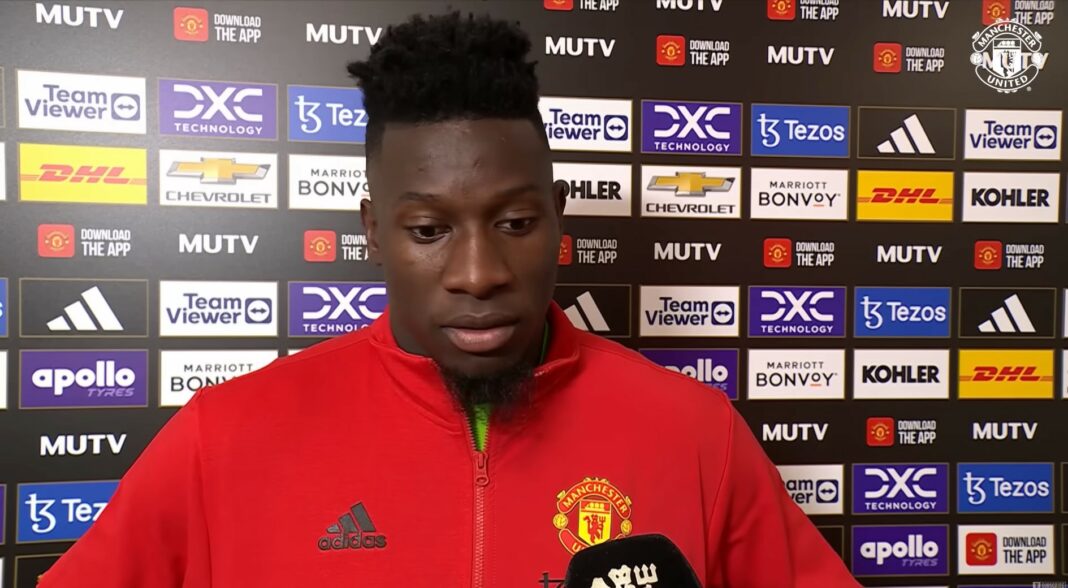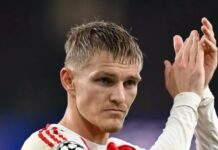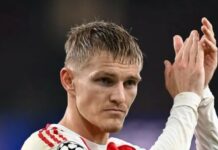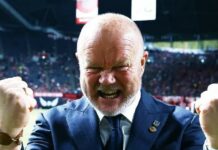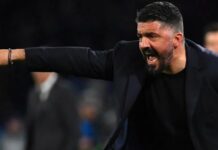Andre Onana’s only appearance for Manchester United this season came in the Carabao Cup second-round defeat to Grimsby.
“It’s hard to be a Manchester United goalkeeper at this moment.”
One of Ruben Amorim’s last public statements before the international break summed up an issue that will come into sharp focus at United’s Carrington training centre this week in the build-up to the Manchester derby at the Etihad Stadium on Sunday.
Read: Another disgruntled Manchester United player uses social media to tell the world about the situation
Since Amorim spoke after the 3-2 win against Burnley, United have paid £18 million to sign the 23-year-old highly valued but inexperienced Senne Lammens from Royal Antwerp instead of Aston Villa’s world champion Emiliano Martinez.
They have also worked towards a deal with Turkish Super Lig club Trabzonspor that will allow Andre Onana, who cost United £47 million when they signed him from Inter Milan two years ago, to leave the club on loan.
This means that Amorim will have to stick with Turkey’s number two goalkeeper Altay Bayindir, who has started all three Premier League games this season but made a big mistake against Burnley and another on the opening weekend that cost a goal against Arsenal, and seemed unsteady against Fulham, against City or give Lammens his debut in a rather unforgiving environment.
This will be done with the knowledge that any mistake will be exploited and the verdict will be immediate and merciless.
What went wrong for Onana?
First, the widely articulated belief that Onana is simply not very good is wrong.
Edwin van der Sar observed the Cameroonian international closely for three years when he was the CEO of Ajax.
Recognized as one of the greatest goalkeepers of all time, Van der Sar was genuinely excited about Onana’s transfer to United and still supported him after a disappointing first season.
It is impossible to imagine that someone as balanced as Van der Sar would speak so enthusiastically about someone without believing that what he said was true.
Onana himself has spoken about his introduction to life at United. “I arrived as the best goalkeeper in the world and boom, it went downhill,” he told BBC Sport ahead of the 2024 FA Cup final. “It was like, what happened?”
Sources close to Onana have said that he was brought to United because of his ability to play short passes – and ended up having to play long ones.
Part of the reason for that was what happened on his Old Trafford debut, when he came far out of the field in a pre-season friendly against Lens and played a pass to Diogo Dalot, who then lost the ball. Onana was lobbed from 50 yards.
Erik ten Hag, who had also worked with Onana at Ajax, cut David de Gea to bring in his new goalkeeper, but the change in tactics reduced the goalkeeper’s efficiency, and the regular mistakes that followed undermined trust in Onana among the supporters.
Ten Hag and then Amorim continued to choose him, but a clear sign that the internal support was ebbing came after the Europa League trip to Lyon in April.
In the build-up, Onana said that he felt United should move on because they were “much better” than the French club.
The comment itself seemed innocent. However, former United midfielder – and a close friend of De Gea’s – Nemanja Matic grabbed it ahead of the match’s press conference, calling Onana “one of the worst goalkeepers in the club’s history”.
It felt like a deliberate attempt to score points on behalf of a friend while increasing the pressure on Onana.
The tactic worked. Onana made two mistakes when the first leg ended 2-2.
Amorim gave Bayindir his Premier League debut in the game that followed against Newcastle, and although Onana looked set to end the season as first choice as he started both the semi-finals and the final of the Europa League, the previous belief in him from the coaching side – Ten Hag postponed his selection for the 2024 Africa Cup of Nations – had waned for so long that the only game he missed was the FA Cup win against Newport – had waned.
Bayindir started the last league game last year and then kept his place in the first three games of this season, although Onana had recovered from the gluteal muscle injury he suffered at the very start of pre-season.
Onana’s only appearance has come in the Carabao Cup defeat to League Two Grimsby, when he was responsible for their second goal.
Amorim clearly felt that he needed a new goalkeeper. Onana is the one he has decided he is willing to do without.
Read on Sporten: Bruno Fernandes rejected Cristiano Ronaldo in three halves
Why United goalkeepers need ‘rhinoceros skin’United’s
explanation for choosing Lammens over Martinez on transfer day was that they wanted someone who will be able to play a pivotal role in their team in three or four years’ time, when they hope to be able to fight for major titles again.
This theory is solid.
What it ignores is the roar of noise that accumulates when a United goalkeeper makes a mistake.
“To be number one at United, you have to have rhinoceros skin,” said Phil Jones, who played 229 games in 12 seasons at the club, mostly in defence.
During Jones’ tenure at the club, seven goalkeepers played in the Premier League – Ben Amos, Anders Lindegaard, David de Gea, Victor Valdes, Sergio Romero, Joel Pereira and Dean Henderson.
“The Manchester United jersey is a heavy one to wear,” he said.
“What is absolutely crucial is that the goalkeeper is calm and can handle certain situations. He must be commanding and not flapping on crosses.
“If a goalkeeper commits a mistake, it becomes contagious very quickly and spreads through the defense unit. If a goalkeeper made a mistake, it was almost like you couldn’t get it out of your system until the next game.”
That’s why Jones feels that De Gea – the goalkeeper he played with the most – proved to be so good, despite having a tough start before eventually winning four club’s player of the year awards.
“When I say rhinoceros skin, he had it,” Jones said.
“It’s reckless in a way, but he almost had this ability to not care. He was quite indifferent to the mistakes he made, even in training sometimes. But when you needed him, he was there.”
Carroll knows the impact of mistakes
De Gea, Van der Sar and Peter Schmeichel are widely recognised as United’s modern great goalkeepers.
Still, there were others in between who helped the club win Premier League titles.
Mark Bosnich and Raimond van der Gouw played in 37 of the 38 games of the championship-winning 1999–2000 season. World champion Fabian Barthez was in goal in 30 games in the 2000-01 title triumph. He did the same in 2002-03, when Roy Carroll played 10 games.
The Norwegian, who currently works as an academy coach in Saudi Arabia, has first-hand experience of what it takes to be a goalkeeper at United.
“I arrived from Wigan in 2001,” he said. “I was 23 years old and was behind Fabian Barthez.”
“It’s not easy to play for Manchester United at the moment, but it was difficult at the time also because everyone expected the new Peter Schmeichel.”
“Even then, if you made a mistake, it was big news. You had to be mentally strong, and that’s still the case.”
“But we’re not robots; We are all human. It’s not so much about what you do on the pitch as what you do off it.”
Carroll knows the impact one moment that a United player can have.
He won a league title for the club and came on as a substitute in the 2004 FA Cup final victory over Millwall. He made a total of 72 appearances for United as part of a career that spanned nearly 500 senior appearances for 11 clubs in five countries.
Still, if you mention his name, chances are that Pedro Mendes’ shot that he dropped over the goal line and saved to safety before the assistant referee noticed, is the moment that comes up.
“I made a big mistake against Spurs and that’s what people are talking about,” he said.
“I’ll take it. I laugh about it. At the time, I wasn’t laughing because I was upset, but as you get older, you become more relaxed.”
Carroll is careful not to push the message of mental strength too far, because he knows that repeating the message and taking it to heart are two very different things.
He speaks openly about the depression – injury-related rather than due to mistakes – he suffered from during his career, which is why he talks about support off the pitch, not just for the United goalkeepers.
“No one taught me how to control the mental side,” he said. “All I was brought in to do was be a goalkeeper – train every day, play every weekend.”
“I played in all the English leagues and whether you’re at the bottom or the top, you have to be mentally strong.”
“You can be the best goalkeeper in the world, but when you lose the mental side of it, it can crush you, like it did with me for quite a while.”
“That’s why I’m trying to help the young goalkeepers because the pressure is now much more intense.”

